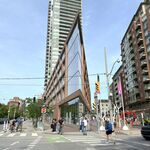AlvinofDiaspar
Moderator
From the Star:
Office towers win tax cuts
Other taxpayers will face increases to make up shortfall if decision stands
Feb 26, 2008 04:30 AM
John Spears
city hall bureau
Toronto's biggest office towers are in line for potentially huge property tax reductions – leaving other taxpayers to pick up the difference – after a decision by an assessment panel.
The stunning decision by the Assessment Review Board also raises the prospect that the towers are owed millions in refunds dating back to 2001, an unexpected expense that lands on the city just as it is trying to pull this year's budget into shape.
While the board's decision doesn't calculate the amount of refunds and tax reductions owed, and an appeal is possible, the amounts in play are staggering:
The successful appeal was launched by the owners of 12 towers in Toronto's biggest office complexes: TD Centre, BCE Place, Commerce Court, First Canadian Place, Scotia Plaza and Royal Bank Plaza.
The combined assessed value of the properties, according to the decision, is more than $5 billion.
At the 2007 commercial tax rate of 4.09 per cent, the towers paid combined taxes of more than $200 million
last year.
Slicing the bank towers' 2007 bill by even 10 per cent could theoretically add about 1 per cent to the annual residential property tax bill to recoup the difference. No lawyers or other officials were willing to speculate on the decision's precise dollar impact.
"The obvious impact for the bank towers, if the decision is upheld on appeal, is their tax burden will go down and the tenants will pay less – materially less," said David Fleet, a lawyer who represented several of the towers.
In most office leases, tenants are responsible for paying property taxes. The towers' tenants include Canada's biggest banks, some of its biggest corporations, including BCE, and many of the biggest law and accounting firms.
Businesses in Toronto have complained for years that they're paying too much tax while homeowners pay too little – a point reiterated last week by Mayor David Miller's fiscal review panel.
The city is gradually shifting the burden off business and onto homeowners, but the decision will increase pressure to do it faster.
The decision will also affect the Ontario government, which collects education property tax from commercial properties based on their assessments.
But there is a limit to how much the bank towers' taxes can be reduced. The province has a complicated "clawback" system that limits how quickly tax burdens can be shifted from one group of taxpayers to another. In some years, commercial properties have successfully appealed their assessments but had more than 90 per cent of the resulting tax decrease clawed back, leaving their taxes little changed.
"We're being sent back to the calculators" to figure out the actual dollars-and-cents impact of the decision, Fleet said.
Neither side would speculate how long that might take. An appeal of the decision could also complicate matters.
The owners of the bank towers had challenged the method by which the Municipal Property Assessment Corporation (MPAC) valued the buildings.
"It's a loud and clear message that MPAC hasn't really assessed these buildings very well," Fleet said.
"There is an implication that everyone who does assessment appeals for commercial, industrial and maybe even multi-residential properties should have a hard look at the way in which they've been assessed," Fleet said.
The bank towers case was highly technical and hinged on what is meant by the words of the Assessment Act, which says assessment should be based on the value of a building "in fee simple, if unencumbered."
Lawyers debated the meaning of the arcane words for weeks last year before assessment board members Susan Campbell and Jacques Laflamme.
The assessment corporation argued the value of the towers should be determined by their value as a going concern, fully occupied by rent-paying tenants.
Lawyers for the towers argued that the wording means the value must be based on a building that is "unencumbered" by tenants and leases.
Instead, they insisted the towers should be valued the same way a house is – as a vacant building on the date of sale, with no tenants and no furnishings. That generally produces a lower value.
The review board sided with the towers; it said the assessment corporation's assessment method "contains a fundamental flaw."
The City of Toronto had joined with MPAC in resisting the bank towers' appeal. But the assessment board rejected the city's submissions, saying they were "based on an incorrect interpretation of the words of the Act."
Larry Hummel, vice president of MPAC, said in an interview that the corporation is studying the decision, but it's "premature" to say whether an appeal is warranted.
"It's clear (the board) made some findings that adopted the complainants' position," Hummel said, but the decision also contains other findings not put forward by the towers' lawyers.
He acknowledged there could be a "significant impact" if the decision stands.
City officials were reluctant to comment because they were still scrutinizing the 56-page ruling.
AoD
Office towers win tax cuts
Other taxpayers will face increases to make up shortfall if decision stands
Feb 26, 2008 04:30 AM
John Spears
city hall bureau
Toronto's biggest office towers are in line for potentially huge property tax reductions – leaving other taxpayers to pick up the difference – after a decision by an assessment panel.
The stunning decision by the Assessment Review Board also raises the prospect that the towers are owed millions in refunds dating back to 2001, an unexpected expense that lands on the city just as it is trying to pull this year's budget into shape.
While the board's decision doesn't calculate the amount of refunds and tax reductions owed, and an appeal is possible, the amounts in play are staggering:
The successful appeal was launched by the owners of 12 towers in Toronto's biggest office complexes: TD Centre, BCE Place, Commerce Court, First Canadian Place, Scotia Plaza and Royal Bank Plaza.
The combined assessed value of the properties, according to the decision, is more than $5 billion.
At the 2007 commercial tax rate of 4.09 per cent, the towers paid combined taxes of more than $200 million
last year.
Slicing the bank towers' 2007 bill by even 10 per cent could theoretically add about 1 per cent to the annual residential property tax bill to recoup the difference. No lawyers or other officials were willing to speculate on the decision's precise dollar impact.
"The obvious impact for the bank towers, if the decision is upheld on appeal, is their tax burden will go down and the tenants will pay less – materially less," said David Fleet, a lawyer who represented several of the towers.
In most office leases, tenants are responsible for paying property taxes. The towers' tenants include Canada's biggest banks, some of its biggest corporations, including BCE, and many of the biggest law and accounting firms.
Businesses in Toronto have complained for years that they're paying too much tax while homeowners pay too little – a point reiterated last week by Mayor David Miller's fiscal review panel.
The city is gradually shifting the burden off business and onto homeowners, but the decision will increase pressure to do it faster.
The decision will also affect the Ontario government, which collects education property tax from commercial properties based on their assessments.
But there is a limit to how much the bank towers' taxes can be reduced. The province has a complicated "clawback" system that limits how quickly tax burdens can be shifted from one group of taxpayers to another. In some years, commercial properties have successfully appealed their assessments but had more than 90 per cent of the resulting tax decrease clawed back, leaving their taxes little changed.
"We're being sent back to the calculators" to figure out the actual dollars-and-cents impact of the decision, Fleet said.
Neither side would speculate how long that might take. An appeal of the decision could also complicate matters.
The owners of the bank towers had challenged the method by which the Municipal Property Assessment Corporation (MPAC) valued the buildings.
"It's a loud and clear message that MPAC hasn't really assessed these buildings very well," Fleet said.
"There is an implication that everyone who does assessment appeals for commercial, industrial and maybe even multi-residential properties should have a hard look at the way in which they've been assessed," Fleet said.
The bank towers case was highly technical and hinged on what is meant by the words of the Assessment Act, which says assessment should be based on the value of a building "in fee simple, if unencumbered."
Lawyers debated the meaning of the arcane words for weeks last year before assessment board members Susan Campbell and Jacques Laflamme.
The assessment corporation argued the value of the towers should be determined by their value as a going concern, fully occupied by rent-paying tenants.
Lawyers for the towers argued that the wording means the value must be based on a building that is "unencumbered" by tenants and leases.
Instead, they insisted the towers should be valued the same way a house is – as a vacant building on the date of sale, with no tenants and no furnishings. That generally produces a lower value.
The review board sided with the towers; it said the assessment corporation's assessment method "contains a fundamental flaw."
The City of Toronto had joined with MPAC in resisting the bank towers' appeal. But the assessment board rejected the city's submissions, saying they were "based on an incorrect interpretation of the words of the Act."
Larry Hummel, vice president of MPAC, said in an interview that the corporation is studying the decision, but it's "premature" to say whether an appeal is warranted.
"It's clear (the board) made some findings that adopted the complainants' position," Hummel said, but the decision also contains other findings not put forward by the towers' lawyers.
He acknowledged there could be a "significant impact" if the decision stands.
City officials were reluctant to comment because they were still scrutinizing the 56-page ruling.
AoD




